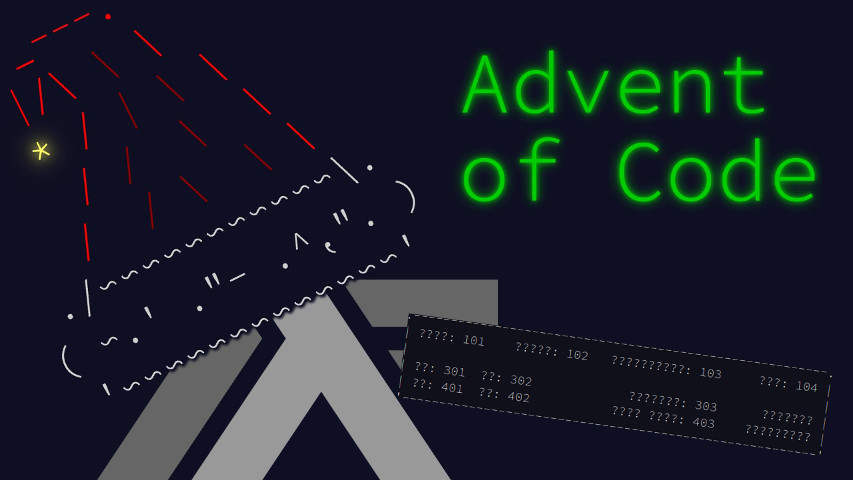Today, AoC starts on a validation problem. Given a set of rules, identify the parts of a data set that don’t comply.
Let’s start with the obligatory literate Haskell header.
{-# LANGUAGE RecordWildCards #-}
import Data.List
import Data.List.SplitAs you can tell from my imports, the parsing isn’t going to be too heavyweight today. The input file is broken into paragraphs, one for fields’ definitions, one for my ticket and one for other people’s tickets. The two last sections have a header line. So here’s a reasonable problem environment definition and high-level parsing.
data Problem = Pb
{ fields :: [Field]
, myTicket :: Ticket
, otherTickets :: [Ticket]
}
parseInput :: String -> Problem
parseInput input =
let [_fields,[_,_myTicket],(_:_otherTickets)] =
linesBy null (lines input)
in Pb { fields = parseField <$> _fields
, myTicket = parseTicket _myTicket
, otherTickets = parseTicket <$> _otherTickets
}The linesBy trick may require a word. It’s really not
operating on lines in the usual sense of it, hence the confusion. Read
it as a form of sepBy that doesn’t include the separator in
the returned strings and doesn’t require termination. I’ve already split
the input by lines, so it’s aggregating sequences of lines separated by
an empty one—the null test. In other words, paragraphs.
The rest of the parsing is simple recursive descent on
Strings with list operations.
type Field = (String,[Range])
parseField :: String -> Field
parseField input =
let (name,':' : ' ' : ranges) = break (== ':') input
[r1,"or",r2] = words ranges
in (name,[parseRange r1,parseRange r2])
type Range = (Int,Int)
parseRange :: String -> Range
parseRange input =
let (lo,'-' : hi) = break (== '-') input
in (read lo,read hi)
type Ticket = [Int]
parseTicket :: String -> Ticket
parseTicket = unfoldr toComma
where toComma "" = Nothing
toComma x = Just (read l,drop 1 r)
where (l,r) = break (== ',') xNow I need to identify invalid tickets. A ticket is invalid if it
features a value that can’t be mapped to a field. (Side note: to
simplify reasoning, even though the statement defines in terms of
negatives, I’ll only use postive predicates, i.e.
isTicketValid instead of isTicketInvalid.)
isTicketValid :: [Field] -> Ticket -> Bool
isTicketValid fields =
all (\value -> any (\field -> isFieldValid field value) fields)And recursive descent to further specify what it means for a value to fit in a field.
isFieldValid :: Field -> Int -> Bool
isFieldValid (_,ranges) value = any (`isRangeValid` value) ranges
isRangeValid :: Range -> Int -> Bool
isRangeValid (low,high) value = low <= value && value <= highLet’s test it!
λ> let Pb{..} = parseInput sample
λ> filter (not . isTicketValid fields) otherTickets
[[40,4,50],[55,2,20],[38,6,12]]
It reports the same tickets as the statement. So far, so good.
The puzzle wants us to sum the offending values from the tickets. So
I’ll slightly alter isTicketValid to return those.
ticketInvalidRate :: [Field] -> Ticket -> [Int]
ticketInvalidRate fields =
filter (\value -> all (not . (`isFieldValid` value)) fields)It was just a matter of replacing all with
filter and inverting the inner logic (any to
all . not).
Let’s verify.
λ> map (ticketInvalidRate fields) otherTickets
[[],[4],[55],[12]]
Those are indeed the offending values. I can now package this to a bona-fide function and glean my gold star.
ticketScanningErrrorRate :: [Field] -> [Ticket] -> Int
ticketScanningErrrorRate fields tickets =
sum $ concatMap (ticketInvalidRate fields) ticketsPart 2 asks for the grunt work: actually identifying which field is which.
I started with a simple backtracking search, operating on the values in ticket order.
orderFields :: [Ticket] -> [Field] -> [[Field]]
orderFields tickets fields0 = go fields0 (transpose tickets)
where
go fields (fieldValues:fvs) = do
validField <- filter (\f -> all (isFieldValid f) fieldValues)
fields
(validField :) <$> go (delete validField fields) fvs
go [] [] = pure []The transpose operation is there to convert a list of
tickets to a list of list of values in ticket order, grouping the
tickets’ values by their index within a ticket.
For each value set fieldValues, it searches the current
list of unplaced fields for one that “fits”. It then recurses down to
identifying a field for the next ticket index, until all fields are
placed or a dead-end is encountered.
λ> let validTickets = filter (isTicketValid fields) otherTickets
λ> map fst <$> orderFields validTickets fields
[[“row”,“class”,“seat”]]
It worked!
Well, it’s an exhaustive search, it’s guaranteed to work. It’s not guaranteed to work fast, though. Let’s implement the puzzle validation logic, so I can ask the site whether I got it right.
checkField :: Field -> Int -> Int
checkField (name,_) value
| "departure " `isPrefixOf` name = value
| otherwise = 1
checkTicket :: [Field] -> Ticket -> Int
checkTicket fields ticket = product (zipWith checkField fields ticket)λ> let [orderedFields] = orderFields validTickets fields
λ> checkTicket orderedFields myTicket
1
Is that answer correct? Hard to say. Well, it obviously is for the sample where no field starts in “departure”, but what about my input data?
The repl didn’t yield an answer in a reasonable time, so I interrupted it and ran the compiled version. That one answered correctly under ten seconds. So I’m not going to need to optimize that search at all, in the end.
Here’s the end of the program for completeness.
main :: IO ()
main = do
Pb{..} <- parseInput <$> readFile "day16.in"
print $ ticketScanningErrrorRate fields otherTickets
let validTickets = filter (null . ticketInvalidRate fields) otherTickets
[orderedFields] = orderFields validTickets fields
print $ checkTicket fields myTicketThis concludes day 16’s solution. See you around for more advent Haskell!
No footnotes today. What’s wrong with me?



